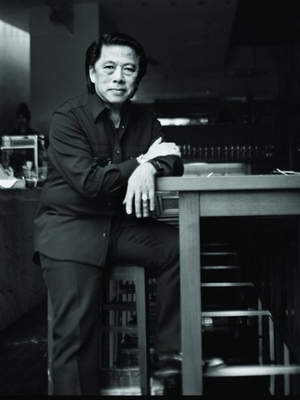 Where others see an ad agency, John Jay sees an incubator to connect artists across time zones.
Where others see an ad agency, John Jay sees an incubator to connect artists across time zones.
 Photo by Michael Rubenstein Photo by Michael RubensteinJohn Jay, executive creative director, Wieden+Kennedy |
Creating creative class
Where others see an ad agency, John Jay sees an incubator to connect artists across time zones.
By Brian Libby
The Tokyo office of Portland advertising agency Wieden+Kennedy occupies a perpendicular intersection, allowing an unobstructed view down Gaen Higashi Street in the fashionable Roppongi district, an ideal perch for watching this fast-paced city go by.
But John C. Jay never stays perched anywhere for long: He’s in his 50s but has the energy of a teenager. “Welcome to Tokyo,” he says cheerfully to a visitor in late October as he stands outside the office dressed in an all-black designer outfit and shiny leather shoes, dropping coins into a sidewalk vending machine. “I saw you coming down the road. Would you like something to drink?”
Although now based in Portland after several years living in Tokyo, each month Jay travels to W+K’s offices in Tokyo and Shanghai, both of which he founded and oversees as partner and executive creative director. The two offices have reported growth of about 20% annually for the last several years. He also travels regularly to the agency’s offices in London and Amsterdam. “He’s become very good at sleeping on planes,” says his wife, Janet Jay, a longtime fashion industry veteran. “I don’t even think he really gets jet lag anymore.”
He also has started with Janet a side project in Portland called Studio J, a company devoted to everything from developing building projects to hosting salons for out-of-town artists and designers. Studio J occupies a massive second-floor open space at Northwest Fifth and Couch, the epicenter of hip Portland with three galleries, a vintage arcade and a Japanese toy store all located there.
As if that and the frequent-flyer miles and side projects weren’t enough, Jay also loves to go out, be it shopping, concerts or gallery openings. “Everything we do has a cultural context,” he says. “We have to be connected to not just advertising and media and corporate people but to the people making culture move. Far too often, advertisers are observers in the culture, not participants. You need to get your hands dirty and live it yourself.”
W+K’s Asian offices have acted as testing ground for involving a broad array of creative talents at the agency: filmmakers, musicians, painters. A focus at W+K has been new media, particularly the Internet. Jay also founded the Tokyo Lab, W+K’s own independent music and video label. In Tokyo, many young people think of Wieden+Kennedy as music producers and don’t even know they create advertising. The purpose, Jay explains, is to act as a creative incubator. “Business is changing rapidly,” he says. “It’s because consumers are changing, especially young people. You need to understand what inspires people today, what’s relevant.”
“Normally people in his age group are suffering from not knowing what’s going on today,” says Dan Wieden, the agency’s co-founder. “But John is actually ahead of most young folks.”
This is a time of transition for ad agencies everywhere. Gone are the days where advertising is just slogans such as “Plop-Plop, Fizz-Fizz” and “Where’s the Beef?” Today companies such as W+K develop brand, a more comprehensive and fluid sense of a company or product. That’s something Jay grasps intuitively, and can be seen in the company’s work for Nike, Diet Coke and ESPN.
“John has the ability to look at things more holistically than through the traditional lens of advertising,” Wieden says. “It’s a much more emotional, aesthetic idea of brand. Evolving that way was just a huge thing for us.”
The funny thing is, before joining Wieden+Kennedy, John Jay had never even worked at an ad agency before.
Born and raised in Columbus, Ohio, to Chinese immigrant parents, Jay grew up in a small dwelling behind the family’s laundry business without bedrooms or even a living room. He had to clandestinely borrow a customer’s outfit from the laundry to attend his high school prom.
Following college at Ohio State University, Jay headed to New York City and began his career in graphic design, laying out newspaper and magazine pages. His big break, though, came at Bloomingdale’s, where as a creative director Jay helped create the store’s iconic “Brown Bag.”
“They were constantly changing and they never had a name on them, yet everyone in the city knew where they came from,” he says. “It challenged every Harvard business notion of branding.”
It’s that kind of thinking that made Dan Wieden offer Jay a job 1993 (his second attempt after the two first met in the late 1980s). “At that time, there was no such thing as people from his background entering advertising,” Wieden recalls. “But we were so struck by his intelligence and charisma that we just thought, ‘We need to work together.’”
During his years in Asia, W+K has been successful in wooing Japanese corporations such as Sapporo beer in addition to the agency’s stout domestic client list. But recently Jay has come to wonder if amid all the globetrotting, he’s neglected W+K’s flagship office in Portland. “We have spent the last year on an intense recruitment, looking for the most unusual talent in the world,” he explains. “I want to be a part of that coming to fruition.”
Jay also wants to get more involved in the city itself, which he sees as a burgeoning cultural capital but one struggling with how best to grow. He served as a curator for the Pacific Northwest College of Art’s “Tokyo Flow” symposium, is on Portland Center Stage’s board and is looking to develop building projects through Studio J. “I think what we must maintain is the outsider mentality,” he says of Portland. “It’s key to the creative energy here.”
He and Janet are set to begin hosting salons at Studio J this year for visiting artists, designers and other creatives, as they have in cities such as Tokyo, Shanghai and Hong Kong. Studio J also is developing a housing project by renowned local architect Brad Cloepfil, whom Jay first met as part of the team that selected Cloepfil to design W+K’s internationally acclaimed Pearl District headquarters.
“You can send him an e-mail from any time zone you choose, and you’ll probably receive an answer within two hours,” Wieden says. “He doesn’t want to let one opportunity escape him. “
“I think I’m always searching for a way to be in the center of the mix, wherever that may be,” Jay reasons, “always thinking that there is something exciting out there, interesting and dynamic people whom I haven’t experienced yet.”
Have an opinion? E-mail [email protected]


